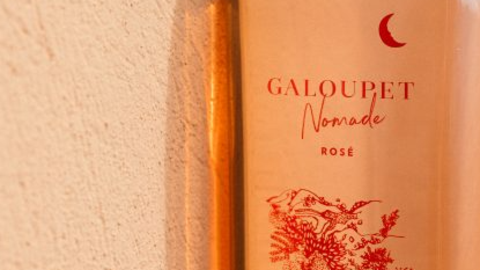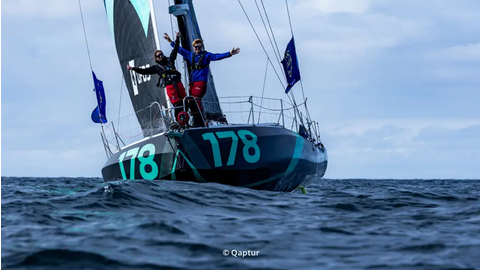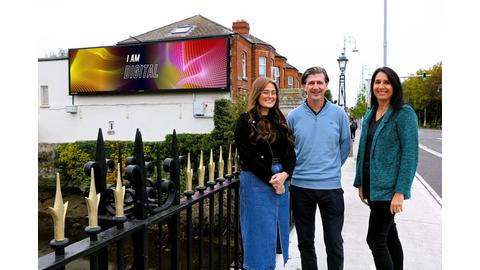Corporate social responsibility • Members
Moët Hennessy launches first Provençal rosé in flat plastic bottle

Moët Hennessy has unveiled a rosé housed in a flat bottle made from ‘prevented ocean plastic’ (POP) that’s both a first for Côtes de Provence and the luxury drinks specialist.
The launch is significant, both for a company that is so focused on upmarket products, and for the fashionable category of the wine business that is Provençal rosé, where thick, clear flint glass is the default option for showing off the pretty, pale salmon pink of the liquid inside and conveying the premium credentials of this controlled wine style and protected source area.
Although the plastic is not coloured, because the bottle is made from recycled material collected from coastal areas, it’s not completely transparent, meaning there’s a faint cloudiness to the appearance of the format – something that could be seen to detract from the premium image of a southern French rosé, particularly one from a strictly governed appellation such as Côtes de Provence.
Secondly, because the bottle is made entirely from plastic, the bottle is light and flexible, which ensures that it’s far removed from the usual firm and heavy feel of a fine French rosé.
On the other hand, this novel format lends the bottle a lower carbon footprint than its glass equivalent, while making this alternative bottle more suitable for outdoor drinking occasions and events.
It also contributes to the removal of plastic pollution from ecologically-sensitive coastal areas.
So why did Moët do it, and where is the rosé from? The wine hails from Château Galoupet, one of 18 Cru Classé estates in Provence, and a property acquired by Moët Hennessy in May 2019, shortly before this group took a majority shareholding in the much larger producer of Provençal rosé, Château d’Esclans, the owner of the Whispering Angel brand.
As for the reason the group decided to bottle a wine in plastic, that is connected to the positioning of Château Galoupet as the most eco-friendly wine producer possible – one that plans not only to be a testbed for environmentally-friendly viticulture, but also a hot spot for biodiversity and bee life, as well as the site of a carbon positive winery.
Already under conversion to organics, and using grapes from its own estate and those sourced from the wider Côtes de Provence area, no berry that goes into this new wine has seen any synthetic product used on it, meaning that the wine will be certified as organic soon.
The rosé, called Galoupet Nomade, is in fact the ‘second wine’ of the Moët Hennessy property, and been given a recommended retail price of £20 – making it, db understands, the most expensive plastic bottle on the shelves today.
As Château Galoupet’s managing director Jessica Julmy said at the launch of the bottle last month in Provence, it is necessary for plastic bottles to be used for finer wines to improve the image of the material. “We need to move away from the idea that eco-friendly is cheap,” she told db.
The bottle is made by Packamama, formerly known as Garçon Wines, and benefits from being fully recyclable, weighing 63 grams – which is almost 10 times lighter than a standard rosé bottle – and, because of its novel flat shape, being 40% spatially smaller than a circular format, which makes it more efficient to pack and transport.
Not only is the bottle a first for Moët Hennessy and Côtes de Provence, but it also sets a new precedent for Packamama, as Galoupet Nomade uses silk screen printing techniques applied directly on to the format, which has never been done before with a plastic wine bottle.
As for the grand vin, or first wine from the estate, that’s a barrel-fermented Cru Classé Côtes de Provence called Château Galoupet, which, in keeping with Cru Classé rules, must be made only with grapes from the classified property, and, because this top expression is made for cellaring as well as drinking in its youth, it is bottled in glass – unlike glass, plastic is not inert nor impermeable to oxygen, making it unsuitable for storing wines that are designed for ageing.
However, in contrast to other top-end Provençal rosés, this Galoupet expression is not bottled in clear glass, but comes in an amber colour (see picture below) as it comprises 70% recycled glass, while it’s lighter than a standard bottle too, weighing 499g, which Moët Hennessy says is 271g lighter than an average bottle of rosé and 101g lighter than the average glass bottle.
It is has been given a retail price of around £45.
Both the rosés come from the 2021 vintage.


